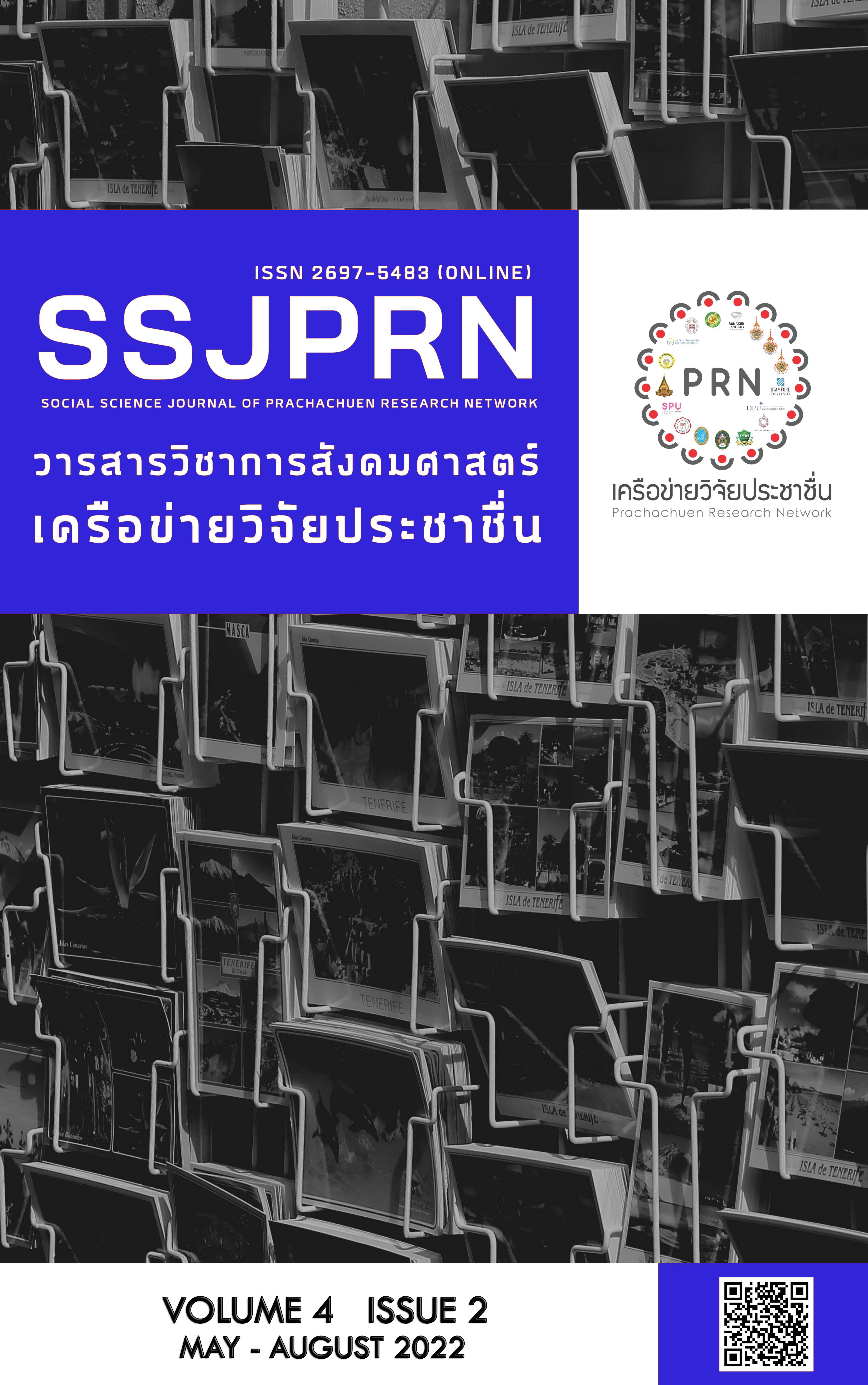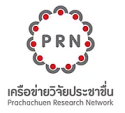มุมมองของผู้บริหารองค์การต่อทิศทางความสามารถทางสังคมที่จำเป็นของผู้ปฏิบัติงานโลจิสติกส์ ส่วนงานคลังสินค้าในบริษัทที่ท่าเรือแหลมฉบัง
คำสำคัญ:
ความสามารถทางสังคม , โลจิสติกส์ , คลังสินค้า, ท่าเรือแหลมฉบังบทคัดย่อ
การวิจัยเชิงคุณภาพนี้มีวัตถุประสงค์ 1) เพื่อสังเคราะห์ทิศทางความสามารถทางสังคมที่จำเป็นของผู้ปฏิบัติงานโลจิสติกส์ ส่วนงานคลังสินค้าตามมุมมองขององค์การในท่าเรือแหลมฉบัง และ 2) เพื่อนำเสนอผลการศึกษาลำดับความสามารถทางสังคมที่จำเป็นของผู้ปฏิบัติงานโลจิสติกส์ ส่วนงานคลังสินค้าตามมุมมองของผู้บริหารองค์การในบริษัทในท่าเรือแหลมฉบัง โดยผู้วิจัยได้สังเคราะห์วรรณกรรมที่เกี่ยวข้องเพื่อนำไปสร้างแบบสัมภาษณ์แบบมีโครงสร้างและให้ผู้เชี่ยวชาญวิเคราะห์ความเที่ยงตรงทางเนื้อหาก่อนนำไปสัมภาษณ์ผู้ให้ข้อมูล 10 คน คือ ผู้บริหารองค์กร ผู้จัดการฝ่ายทรัพยากรบุคคล และผู้จัดการฝ่ายโลจิสติกส์ ทำการวิเคราะห์ข้อมูลตามรูปแบบสร้างสรรค์นิยมและการเข้ารหัสเชิงทฤษฎี จากนั้นนำผลการลงความเห็นทิศทางและความเร่งด่วนของความสามารถทางสังคมที่บริษัทในท่าเรือแหลมฉบังควรพัฒนาให้แก่ผู้ปฏิบัติงานไปวิเคราะห์คะแนนเฉลี่ยเพื่อจัดลำดับประเด็นความสามารถทางสังคมเร่งด่วน ผลการสังเคราะห์พบว่ามี 10 ปัจจัยสำคัญ ได้แก่ 1) ทักษะสื่อสาร 2) ทักษะความเป็นผู้นำ 3) ทักษะประสานงานจัดการทีม 4) ทักษะแก้ปัญหา 5) ด้านจรรยาบรรณและศีลธรรม 6) ทักษะจัดลำดับความสำคัญ 7) ทักษะสร้างและสานความสัมพันธ์กับผู้อื่น 8) ทักษะนำเสนอความคิดสร้างสรรค์ 9) ความกระตือรือร้นและใฝ่เรียนรู้ และ 10) ทักษะความรับผิดชอบ ผลการศึกษาสามารถนำไปใช้ออกแบบหลักสูตรฝึกอบรมทรัพยากรมนุษย์ เพื่อประโยชน์ของฝ่ายทรัพยากรมนุษย์ในอุตสาหกรรมบริการโลจิสติกส์ในธุรกิจท่าเรือ
เอกสารอ้างอิง
กองยุทธศาสตร์การพัฒนาระบบโลจิสติกส์. (2564). รายงานโลจิสติกส์ของประเทศไทย ประจำปี 2563. สืบค้นจาก https://www.nesdc.go.th/ewt_dl_link.php?nid=11803
ประกาศคณะกรรมการส่งเสริมการพัฒนาฝีมือแรงงาน เรื่อง มาตรฐานฝีมือแรงงานแห่งชาติ สาขาอาชีพผู้ปฏิบัติการคลังสินค้า. (2557, 16 กรกฎาคม). ราชกิจจานุเบกษา. เล่ม 131 ตอนพิเศษ 131 ง. หน้า 201-211.
แพมาลา วัฒนเสถียรสินธุ์. (2559). ปัจจัยที่ส่งผลต่อปัญหาการสื่อสารในองค์กร กรณีศึกษาบริษัท ยูไนเต็ด แสตนดาร์ด เทอร์มินัล จำกัด (มหาชน). (วิทยานิพนธ์ปริญญามหาบัณฑิต, มหาวิทยาลัยธรรมศาสตร์.
ภัค วีระเสถียร และกมลชนก สุทธิวาทนฤพุฒิ. (2563). ความต้องการสมรรถนะแรงงานด้านโลจิสติกส์ภาคอุตสาหกรรมเป้าหมายในพื้นที่เขตพัฒนาเศรษฐกิจพิเศษภาคตะวันออก (EEC). วารสารมนุษยศาสตร์ ฉบับบัณฑิตศึกษา, 9(2), 110-124.
ภาณุมาศ เนียมพลับ และสุรมงคล นิ่มจิตต์. (2562). สมรรถนะของเจ้าหน้าที่จัดการคลังสินค้าที่ตรงกับความต้องการของตลาดแรงงานในภาคอุตสาหกรรมธุรกิจการขนส่งสินค้าทางอากาศ. วารสารวิจัยราชภัฏกรุงเก่า, 6(2), 1-8.
รวิศ หาญอุตสาหะ. (2562). ทักษะที่ควรมี ถ้าอยากรอดจากการแทนที่ของ AI. สืบค้นจาก https://techsauce.co/tech-and-biz/rawit-hanutsaha-on-the-future-of-work-and-skills- that-arent-about-to-be-automated
รัตนวัชร์ เพ็ญรัตนหิรัญ และก่องทรัพย์ ทองคำ. (2564). การสำรวจ Soft Skills ที่จำเป็นของสถานประกอบการในศตวรรษที่ 21. วารสารวิจัยรำไพพรรณี, 15(1), 59-69.
ศูนย์เทคโนโลยีสารสนเทศและการสื่อสาร สำนักงานปลัดกระทรวงคมนาคม. (2562). สืบค้นจาก https://datagov.mot.go.th/organization/mot-ict
สถาบันคุณวุฒิวิชาชีพ. (2564). กรอบคุณวุฒิวิชาชีพ สาขาวิชาชีพโลจิสติกส์. สืบค้นจาก https://tpqi-net.tpqi.go.th/home/occ/industrialInfo/LOG
สำนักงานสภาพัฒนาการเศรษฐกิจและสังคมแห่งชาติ. (2560). แผนพัฒนาเศรษฐกิจและสังคมแห่งชาติ ฉบับที่สิบสอง พ.ศ. 2560 - 2564. สืบค้นจาก https://www.nesdc.go.th/ewt_dl_link.php?nid=6422
UNDP (2020). Human development reports 2020: The next frontier, human development and the anthropocene. Retrieved from http://hdr.undp.org/sites/ default/files/ hdr2020.pdf
Abullah, A. R., Muhammad, M. Z., & Md Naris, N. A. (2019). The role of soft skills within business students towards graduate employability. Journal of Entrepreneurship and Business, 7(2), 1-14.
Adecco, I. (2021). Top 10 skills needed to work in logistics. Retrieved from https://www.adecco.co.uk/blog/top-10-skills-needed-to-work-in-logistics
Alsafadi, L., & Abunafesa, R. (2012). ICT Skills gap analysis of the Saudi Market. Proceedings of the World Congress on Engineering and Computer Science Vol I, WCECS 2012, San Francisco, USA.
Anju A. (2009). A holistic approach to soft skills training. IUP Journal of Soft Skills, 3(1), 7-11.
Bowen, B., & Shume, T. (2020). Developing workforce skills in K-12 classrooms: How teacher externships increase awareness of the critical role of effective communication. Journal of STEM Education: Innovations and Research, 21(1), 35-43.
Carvalho, D. (2021). Skills & training: Skills required for logistics & transport. Retrieved from https://www.insidecareers.co.uk/career-advice/skills-required-for-logistics-transport/
Charmaz, K. (2006). Constructing grounded theory: A practical guide through qualitative analysis. UK.: Sage.
Charney, D. (2016). Wanted: Workers with soft skills. Retrieved from https://www.mhlnews.com/ labor-management/article/22052552/wanted-workers-with-soft-skills
Credé, M., & Kuncel, N. R. (2008). Study habits, skills, and attitudes: The third pillar supporting collegiate academic performance. Perspectives on Psychological Science, 3(6), 425-453.
Creswell, J. W., & Inquiry, Q. (1998). Research design: Choosing among five traditions. Thousand Oaks, CA: Sage.
Dana, H., Hancock, C., & Phillips, J. (2011). A research proposal to evaluate the merits of writing across the curriculum. American Journal of Business Education, 4, 15-20.
DHL Supply Chain. (2017). The supply chain talent shortage: From gap to crisis. Retrieved from https://www.dhl.com/content/dam/dhl/global/dhl-supply-chain/documents/info-graphics/glo-dsc-talent-gap-survey-infographic.pdf
Glenn, J. L. (2008). The “new” customer service model: Customer advocate, company ambassador. Business Education Forum, 62(4), 7-13.
JobsDB. (2016). เด็กจบใหม่ที่ ไม่อยากว่างงาน ฟังทางนี้. Retrieved from https://th.jobsdb. com/th-th/articles/ทำไมเด็กจบใหม่ว่างงาน
John, J. (2009). Study on the nature of impact of soft skills training programme on the soft skills development of management students. Pacific Business Review, 7(12), 925-929.
Joungtrakul, J. (2010). Qualitative research: A tool for knowledge creation for national development. Bangkok: Business Law Center International Company Limited.
Jungsun, K., Mehmet, E., JeoungWoo, B., & Hwayoung, J. (2011). Training soft skills via e-learning. International Journal of Contemporary Hospitality Management, 23(6), 739-763.
Mitchell, G. W., Skinner, L. B., & White, B. J. (2010). Essential soft skills for success in the twenty-first century workforce as perceived by business educators. Delta Pi Epsilon Journal, 52, 43-53.
Perreault, H. (2004). Business educators can take a leadership role in character education. Business Education Forum, 59, 23-24.
Schneider, W. J., & Newman, D. A. (2015). Intelligence is multidimensional: Theoretical review and implications of specific cognitive abilities. Human Resource Management Review, 25(1), 12-27.
Seetha, N. (2014). Are soft skills important in the workplace? - A preliminary investigation in Malaysia. International Journal of Academic Research in Business and Social Science, 4(4), 44-56.
Singh, R. (2008). Relational embeddedness, tertius iungens orientation and relationship quality in emerging markets. Asia Pacific Journal of Marketing and Logistics, 20(4), 479-492.
Thai, V. V., Cahoon, S., & Tran, H. T. (2011). Skill requirements for logistics professionals: Findings and implications. Asia Pacific Journal of Marketing and Logistics, 23(4), 553-574.
Vasanthakumari, S. (2019). Soft skills and its applicationin work place. World Journal of Advanced Research and Reviews, 3(2), 66-72.
Wall Street Journal. (2016). What is the difference between management and leadership? Retrieved from https://zhort.link/IOV
Wiki Job. (2020). SoftSkills. Retrieved from https://www. wikijob.co.uk/content/interview-advice/competencies/soft-skills
ดาวน์โหลด
เผยแพร่แล้ว
รูปแบบการอ้างอิง
ฉบับ
ประเภทบทความ
สัญญาอนุญาต
ลิขสิทธิ์ (c) 2022 วารสารวิชาการสังคมศาสตร์เครือข่ายวิจัยประชาชื่น

อนุญาตภายใต้เงื่อนไข Creative Commons Attribution-NonCommercial-NoDerivatives 4.0 International License.
บทความที่ได้รับการตีพิมพ์เป็นลิขสิทธิ์ของวารสารวิชาการสังคมศาสตร์เครือข่ายวิจัยประชาชื่น







